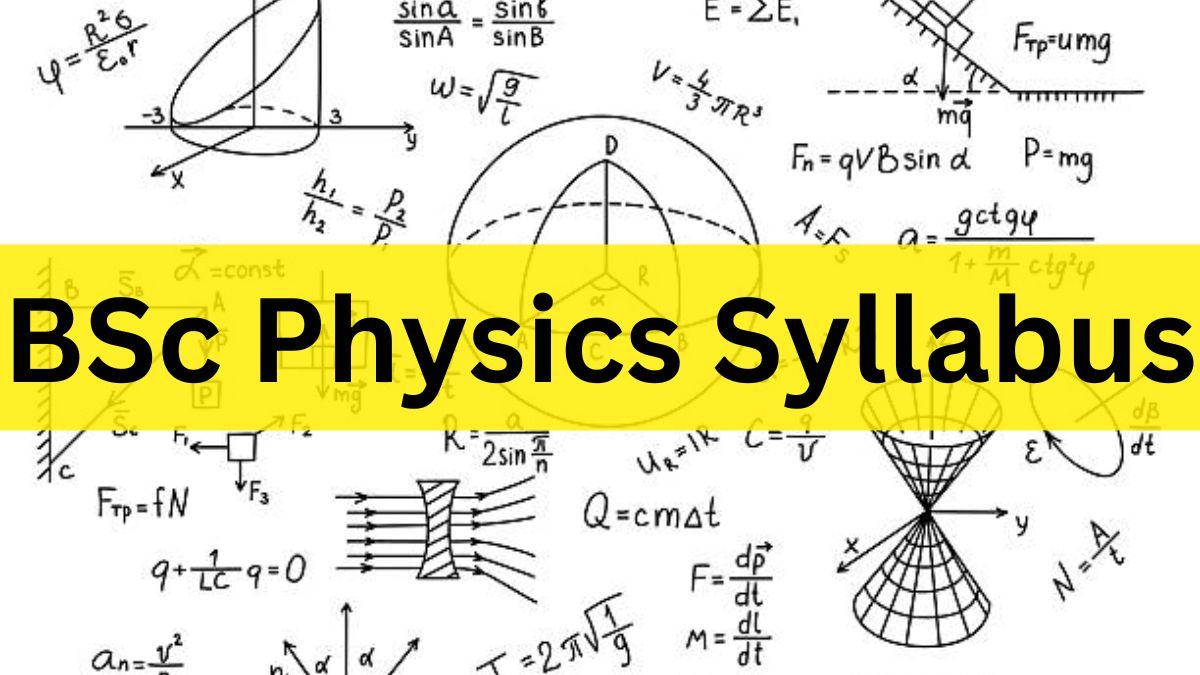Table of Contents
The BSc Physics or Bachelor of Science in Physics is one of the toughest course to pursue all round the world. The toughness of this course comes from its vast and difficult syllabus. The BSc Physics syllabus consists of subjects from various domains of Physics like Mechanics, Quantum physics, optics, modern physics, etc. The BSc Physics syllabus is grounded in the core principles of physics and the natural sciences. It encompasses both theoretical and practical topics. In this post, we will study about the BSc in Physics syllabus in detail.
BSc Physics Syllabus
The BSc Physics syllabus encompasses a broad spectrum of topics including mechanics, heat, light, radiation, sound, electricity, magnetism, and atomic structure. Having an interest in science, many students in class 12 or after passing board exams can be attracted to the field of physics. Prior to choosing a career in physics, it is essential for a candidate to review the syllabus of a BSc Hons/General Degree and also examine the curriculum to understand the Course Learning Outcome (CLO) aspect of the course.
BSc Physics Syllabus 2025
The BSc Physics syllabus 2025 has been released by the universities for students who want to take admission in this season. Students can check the complete list of subjects included in the BSc Physics program and make an informed choice. The BSc Physics is a six-semester undergraduate program that spans over three years. Every academic term consists of theoretical courses, lab sessions, and hands-on assessments.
The subjects covered in a Bachelor of Science in Physics program include a variety of topics in natural science like electricity, optics, magnetism, thermodynamics, waves, electrodynamics, mechanics, kinetic theory, quantum physics, energy, power, and other related subjects. Subjects covered in BSc Physics courses explore the operations of the world.
BSc in Physics Syllabus
The BSc Physics Course holds significance in the field of science. Students interested in enrolling in a BSc Physics program should thoroughly review the BSc Physics curriculum and courses that they will need to complete over the next three years. The syllabus for a BSc in Physics is highly comprehensive and is best suited for students who are fully committed to completing the program. The BSc Physics course demands strong commitment and perseverance to grasp the complex principles and theories. Opting for a BSc in Physics can be an intriguing option for individuals who are interested in pursuing a career in science and making scientific breakthroughs.
BSc Physics Syllabus Year Wise
Prior to enrolling in this program, students should ensure to review the BSc Physics curriculum to grasp the concepts clearly. Completing a BSc Physics course opens up job prospects in various industries catering to different skillsets, and exceptional students may secure positions in global organizations like NASA, ISRO, SpaceX, and more. The potential for advancement post BSc Physics is vast as students can choose to further their studies by pursuing an MSc Physics or a related program. Check the year-wise BSc Physics syllabus here.
BSc Physics Syllabus 1st Year
Below is the list of subjects included in the BSc Physics first year syllabus that candidates can refer to:
| B.Sc Physics First Year Syllabus | |
| Mechanics & Props of Matter | Optics |
| C programming | Calculus |
| Foundation Course in Maths | Environmental Studies |
| Physical Chemistry 1 | Organic Chemistry |
| Physics Lab-1 | Physics Lab-2 |
| Chemistry Lab-1 | Chemistry Lab-2 |
BSc Physics Syllabus 2nd Year
Candidates can access the list of subjects in the BSc Physics second-year syllabus below.
| B.Sc Physics Second Year Syllabus | |
| Solid-state Physics | Classical Mechanics & Relativity |
| Electricity and magnetism | Electromagnetic Theory |
| Inorganic Chemistry 1 | Basic Electronics |
| Biophysics and Radiation Science | Mathematical Physics |
| Open Elective | Nuclear Physics |
|
– |
Physics Lab |
BSc Physics Syllabus 3rd Year
Below is where candidates can find the subjects that are encompassed in the third-year syllabus for BSc Physics.
| BSc Physics Third Year Syllabus | |
| Quantum Mechanics | Renewable Energy |
| Statistical Mechanics | Digital Electronics |
| Oscillations & Waves | Instrumentation |
| Applied Optics | Atomic & Molecular Physics |
|
– |
Particle & Astrophysics |
BSc Physics Syllabus Semester Wise
Candidates can check the semester wise syllabus in detail for the BSc Physics program below.
| Subjects | Detailed Syllabus |
| Semester 1 | |
| Introduction to Mathematical Physics | Vector Calculus, Multiple Integrals, Dirac Delta Function, Special Integrals, etc. |
| Mechanics | This subject includes fundamentals of concepts such as force, motion, gravity, and elasticity to give students an in-depth understanding of engineering along with Mechanical Engineering.
Topics include Fundamentals of Dynamics and Rotational Dynamics, Gravitation, Work and Energy, Collision, Elasticity, etc. |
| Chemistry | This subject involves organic chemistry and bonding solid forces to help students understand chemical functions, structures of thermodynamics and kinetics. |
| Semester 2 | |
| Electricity & Magnetism | Electric Circuits, Magnetic Fields, Properties of Matter, Electromagnetic Induction, etc. |
| Oscillations & Waves | Collinear Harmonic oscillations, Wave Optics & Motion, Interference, Diffraction, etc. |
| Technical Writing and Communication in English |
Technical writing is important to equip students with the knowledge of gathering, interpreting and documenting technical information for making logical and ethical structures. |
| Semester 3 | |
| Digital Electronics | Analog and digital circuits, Boolean Algebra, Integrated Circuits, CRO, Timers, Shift Registers, etc. |
| Computer Programming and Microprocessors |
Programming languages such as C++, control statements, and array structures help students with identifying different elements and functions of contemporary microprocessing. |
| Thermal Physics | Thermodynamics, Kinetic Theory of Gases, distribution of velocities and consists of key concepts of thermal physics like thermodynamic systems, atmosphere, and properties. |
| Semester 4 | |
| Mathematical Analysis and Statistics |
This subject focuses on the analysis of sequences and series uniform convergence and intelligence integration. All these concepts enable students to gain knowledge of basic functions and methods used to understand the complexity of Beta and Gamma functions. |
| Modern Physics | Planck’s Quantum, Two slit interference, Radioactivity, Quantum Mechanics, Fission & Fusion, etc. |
| Analog Systems & Applications | Semiconductor Diodes, Bipolar Junction transistors, Sinusoidal Oscillators, Amplifiers & Operational Amplifiers, Conversion, etc. |
| Semester 5 | |
| Atomic and Molecular Physics | Crystal Structure, Dielectric Properties, Band Theory, Superconductivity, Lattice Dynamics, etc. |
| Quantum Mechanics | Time-dependent & independent Schrodinger equation, bound states, hydrogen-like atoms, etc. |
| Elective | Can vary based on choice |
| Semester 6 | |
| Electromagnetic Theory | EM Wave Propagation, Maxwell Equations, Optical Fibres, Polarization, etc. |
| Statistical Physics | The classical & quantum theory of radiation, Bose-Einstein statistics, and Fermi-Dirac Statistics. |
| Elective | Can vary based on the chosen subject |
BSc Physics Subjects
The BSc Physics curriculum includes fundamental, optional, and laboratory courses aimed at promoting thorough understanding. It includes key subjects like electricity, magnetism, mechanics, waves, optics, and others. The BSc Physics syllabus includes key subject areas based on UGC guidelines.
BSc Physics Core Syllabus
These are the main subjects you will learn in the BSc Physics program:
- Mechanics (including Classical Mechanics, Relativity, and Statistical Mechanics)
- Electricity and Magnetism
- Waves and Optics
- Mathematical Physics I
- Thermodynamics and Kinetic Theory
- Nuclear and Particle Physics
- Electronics and Instrumentation
- Mathematical Physics II
- Quantum Mechanics I
- Solid State Physics
- Atomic and Molecular Physics
- Computational Physics
- Quantum Mechanics II
- Advanced Electrodynamics
- Nuclear Physics and Applications
- Condensed Matter Physics
- Statistical Mechanics and Applications
- Astrophysics and Cosmology
- Material Science
- Project/Dissertation
BSc Physics Elective Syllabus
Students can select from a variety of elective courses that match their passions and future goals. Some common elective choices are:
- Geophysics
- Biophysics
- Medical Physics
- Nanotechnology
- Environmental Physics
- Computational Physics
- Robotics
- Artificial Intelligence
- Machine Learning
- Data Analysis
BSc Physics Practical/Lab Subjects
Throughout the course, students will engage in scheduled lab sessions to apply the theoretical concepts learned in class. These BSc Physics lab topics will cover a wide range of subjects, including:
- Mechanics Lab
- Electricity and Magnetism Lab
- Waves and Optics Lab
- Electronics and Instrumentation Lab
- Nuclear and Particle Physics Lab
- Solid State Physics Lab
- Physics Lab V
- Physics Lab VI
B.Sc Physics Syllabus PDF DU
The University of Delhi is one of the best universities when it comes to pursuing BSc Physics course. The B.Sc Physics curriculum at DU has been meticulously designed to give students knowledge about the classical physics as well as about the latest developments. Students can download the B.Sc Physics Syllabus for Delhi University below.
Download B.Sc Physics Syllabus DU
BSc Physics Syllabus IGNOU
IGNOU is the best university for students who want to pursue a bachelor’s degree in Physics in distance mode. The official syllabus PDF for the BSc Physics program at IGNOU has been given below.
Best Books for Bachelor in Physics
Students can check the list of best books that students must study during their undergraduate physics course below.
| Book Name | Author/Publication Name |
| Ist Year | |
| Fundamentals of Physics | – R.Resnik,D. Halliday and Walker; Wiley 6ed(2001) |
| Physics-Classical and Modern | FJ Keller, E Gettys and J J Skove, McGraw Hill Second Revised Edition(1993) |
| Classical Mechanics | -K N Sreenivasa Rao, Universities Press- Orient Longman (2003 ed) |
| Elements of Properties of matter | D S Mathur, S.chand(GL) |
| Heat and Thermodynamics | Brij Lal and N Subramanyam |
| Heat, Thermodynamics & Stastical Mechanics | BrijLal & Subramanyam |
| Concepts of Physics Vol (1) | H C Verma |
| Newtonian Mechanics | A P French |
| Mechanics & Thermodynamics | G Basavaraju & Dipan Ghosh |
| Waves & Oscillations | P K Mittal & Jai Dev Anand |
| IInd Year | |
| Electricity and magnetism | Brij Lal and N Subrahmanyam, Rathan Prakashan Mandir, Nineteenth Edition, 1993 |
| Introduction to Electrodynamics | DJ Griffiths Pearson Education (2015) |
| Electromagnetism | BB Laud 2ed |
| Optics | Ajoy Ghatak, Tata Mc Graw Hill, 4th Edition |
| Introduction to Modern Optics | Ajoy Ghatak, Tata McGraw Hill Publications (2009) |
| Principles of Optics | B K Mathur, Gopal Printing Press, Kanpur, 6th Edition, (1996) |
| Mathematical Physics | B D Gupta, Vikas Publshing House, 4th ed (2016) |
| IIIrd Year | |
| Quantum Mechanics | B.H. Bransden and C.J. Joachain, |
| Modern Quantum Mechanics | J.J. Sakurai |
| Statistical Mechanics, An Introduction | Evelyn Guha |
| Weather, climate and atmosphere | Siddartha. |
| Statistical Mechanics | K.Huang |
| Astrophysics Concepts | M. Herwit: John Wiley, (1990) |
| Introduction to solid State Physics | Charles Kittel, VII edition, (1996) |
| Electronic Devices and Circuit Theory | Robert Boylestead and Louis Nashelsky |
| Essential of crystallography | M A Wahab, |





 CUET Physics Syllabus 2025 PDF Download ...
CUET Physics Syllabus 2025 PDF Download ...
 CUET Syllabus 2025 for Commerce Students...
CUET Syllabus 2025 for Commerce Students...
 CUET Arts Syllabus 2025 Out: Check CUET ...
CUET Arts Syllabus 2025 Out: Check CUET ...










